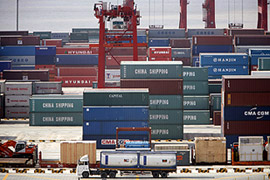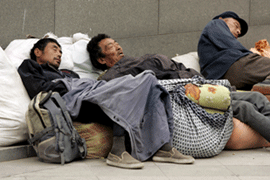US and China pledge trade boost
Officials agree new efforts to keep trade flowing amid global slowdown.

The high-level talks in Beijing marked the fifth round of meetings under the biannual Strategic Economic Dialogue (SED) and the last to take place under the Bush administration.
In a closing statement on Friday, Wang Qishan, the Chinese vice-premier, said China was looking forward to further “candid and pragmatic” talks with the incoming US administration under Barack Obama, the US president-elect.
‘Important role’
 |
| China is seeing slowing demand for its exports as the global financial crisis bites [EPA] |
“Both sides think highly of the important role of the SED mechanism and its achievements,” Wang said.
“We both agreed that we should continue to enhance dialogue in the new circumstances.”
One of the central themes of the talks was China’s ability to maintain domestic growth, and so help lift the global economy.
Reiterating a message he gave at the start of the talks, Wang said the priority remained focused on restoring market confidence to avoid the spread of the financial crisis and avert recession.
He added that the Chinese and US delegations had agreed to push for a conclusion to the World Trade Organisation’s long-running Doha round of market-opening talks.
But, Wang said, the overall result of the negotiations had to be “balanced”.
“We are opposed to any form of protectionism,” he said.
‘Balanced growth’
From the US delegation, Paulson welcomed recent steps by the Chinese government to boost home-grown demand.
“As in the past, we discussed the importance of domestic-led growth, and the importance of a market-determined currency in promoting balanced growth in China that will contribute to a healthy global economy,” the US treasury secretary said.
But amid the pledges to support the world economy, the value of the Chinese currency, the yuan, remained a key bone of contention.
Paulson said he had pressed the Chinese side to allow the yuan to appreciate more quickly – echoing concerns from US business who say that an artificially low yuan gives Chinese exporters an unfair advantage.
Paulson said the two days of dialogue had seen a “robust discussion of the current global financial market turmoil and economic downturn, its implications for both our nations and our efforts to address it”.
But he said the two days of talks had shown that both China and the US were “committed to strengthening the global economy”.
Unrest warning
 |
| Rising unemployment risks growing social unrest, a leading scholar has warned [EPA] |
The end of the talks coincided with a warning from a leading Chinese communist party scholar that China risks massive social turmoil next year as the economy slows and more people are thrown out of work.
In a commentary published in the China Economic Times, Zhou Tianyong, a researcher at the Central Party School in Beijing urged the Chinese leadership to focus development priorities on job creation.
China’s growth rate is expected to slow to about 7.5 per cent next year, below the 8 per cent level generally accepted as necessary to create enough jobs to meet an expanding labour force.
In his commentary Zhou warned that the resulting unemployment and growing strains between rich and poor could erupt into searing unrest that will test the communist party’s grip on power.
“The redistribution of wealth through theft and robbery could dramatically increase and menaces to social stability will grow,” he wrote.
“This is extremely likely to create a reactive situation of mass-scale social turmoil.”